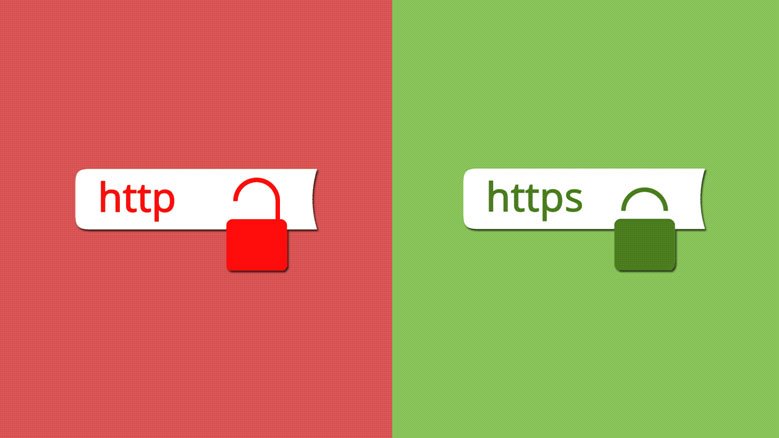Securing Website by Converting HTTP to HTTPS
With the increasing concern regarding online privacy and security, maintaining safety over the internet has become a daunting task. However, with time, technology tends to involve in a way that the end-user can get the best experience in hand.
Talking about which, you must’ve noticed that most of the websites that are on the top list of your Google search contain “HTTPS” in their URL.

Every wondered why the need of HTTPS was felt? If it’s actually better than regular HTTP websites, what you need to do in order to convert it into HTTPS?
This article focuses on letting you know everything about the fuss related to HTTP and HTTPS and how you can change the former into later. HTTP is a transfer protocol, which is responsible to transfer hypertext based webpage over the Internet.
HTTPS is advanced version of HTTP that is responsible to transfer webpage with security of all data transferring with the page.
Before we get into the actual process of converting your HTTP website to HTTPS, let’s first have a look at the valid reasons that account for the required efforts for this transformation. So without any further delay, here are these reasons:
-
HTTPS is way more secure than your regular HTTP website:
The very first reason that calls for this transformation is the safety of all confidential data of users by HTTPS. On the other hand, when a user visits an HTTP website, there are several hackers and other third-party entities that can tamper with the user data.
Even when you move cursor over an icon nearby URL section in browser, you will get a message “this is not a secure page”. This is the reason why a smart user would avoid clicking on the link of an HTTP website.
You can make your website secure and free from the possibility of any attacks by converting it into HTTPS. This will be extremely effective in building the trust of any online user that visits your website because of the fact that everyone is concerned about their online security.
According to several online surveys and studies, this tends to have a major impact on the amount of traffic you get on your website. Having an HTTPS website not only promises the trust of your user but also lets your website to have a relatively larger audience.
-
Google ranking of HTTPS websites is significantly better:
Another reason for changing your HTTP website to HTTPS is the enhanced website ranking you get with an HTTPS website whenever a user makes a Google search.
It plays a crucial role when it comes to deciding the position of your website in the list of several others shown by Google.
Considering the fact that Google is widely used by people for making most of their web searches, converting your website to HTTPS can enhance its ranking.
This way you will be able to prevent your website from being outranked by Google algorithm which is known to favor the HTTPS websites. Google does that in order to ensure the security of users forwarded to the respective websites by it.
It said that, if you want to considerably improve the Google ranking of your website, it is about time that you update your website and make it HTTPS.
-
You get updated browser labels with HTTPS:
Even if a user does not have the significant technological knowledge, seeing a red label mentioning a “NOT SECURE” connection can trigger anxiety and stress. In that case, maximum users won’t even click on the website link, forget about providing any information.
The main reason why HTTPS websites are secure is that the exchange of data occurs in an encrypted manner, thus blocking the chance of an intruder to take advantage of the user data.
Considering the vulnerability of HTTP, Google has not only started preferring HTTPS for higher ranking but at the same time, it is also updating the labeling of HTTP websites.
The URL bar of Google Chrome is to be updated to show a “not secure” label before an HTTP website so that a user can know this before clicking on the link.
Therefore, it becomes crucial to understand that you need to convert your HTTP website to HTTPS in order to prevent it from being flagged by Google.
It will not only make your website more secure than before but will also enhance the amount of confidence and trust any user has while visiting your website.
In the light of our discussion, it becomes clear that converting your HTTP website to HTTPS has become a crucial step and more of an unavoidable one, because you wouldn’t want to bear the obvious losses.
Now, come to the step by step process of making this conversation possible. The following six steps will let you convert an unsecured HTTP website into HTTPS– the secured one.
- A host is required in order to make this transformation possible and the first thing you need to do is to arrange one. Make sure that the HTTPS website can be positively delivered by your host so that you can use it accordingly.
- Next thing you need to do is to get SSL certificate from your host so that your website can be successfully converted into HTTPS. SSL certificate is mandatory when it comes to having an HTTPS website.
- Once you obtain the required SSL certificate from your host, now comes the time to configure this certificate with your host. It is essential to do so in order to avoid any warning of invalid certification.
- At this step, clear the cache of your website.
- Now, you need to convert the link of HTTP website to HTTPS one. For this, you should convert the non Content Management System or CMS generated links first and then convert the CMS ones. It becomes handy when you have several links to be converted at a time. Also, incoming HTTP requests are to be directed to HTTPS in the case of Apache-based websites.
- In the end, you have to change the links of content present on your website. This content including everything from articles to blogs published on your website. This needs to be done for every link so that your website can be converted into HTTPS completely.
Follow these seven steps, and have your HTTPS website ready to stand in the list of secured websites out there.
Eneet Kaur Author
Eneet Kaur is a professional content marketer and formally working at Best SEO India. Writing is her strong passion and she has written quality blogs for many high – auditorial blog sites. She is a spontaneous learner in her field of internet marketing.
Apart from that, she has a great knowledge of Online Reputation Management, Quality Link Building Tech Consultancy, etc.

